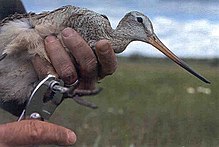
| Part of a series on |
| Biology |
|---|
Ornithology is a branch of zoology that concerns the study of birds.[1] Several aspects of ornithology differ from related disciplines, due partly to the high visibility and the aesthetic appeal of birds.[2] It has also been an area with a large contribution made by amateurs in terms of time, resources, and financial support. Studies on birds have helped develop key concepts in biology including evolution, behaviour and ecology such as the definition of species, the process of speciation, instinct, learning, ecological niches, guilds, island biogeography, phylogeography, and conservation.[3]
While early ornithology was principally concerned with descriptions and distributions of species, ornithologists today seek answers to very specific questions, often using birds as models to test hypotheses or predictions based on theories. Most modern biological theories apply across life forms, and the number of scientists who identify themselves as "ornithologists" has therefore declined.[4] A wide range of tools and techniques are used in ornithology, both inside the laboratory and out in the field, and innovations are constantly made. Most biologists who recognise themselves as "ornithologists" study specific biology research areas, such as anatomy, physiology, taxonomy, ecology, or behaviour.[5]
- ^ Newton, Alfred; Lydekker, Richard; Roy, Charles S.; Shufeldt, Robert W. (1896). A dictionary of birds. London: A. and C. Black.
- ^ Newton, Ian (1998). Population limitation in birds. Academic Press. p. 2. ISBN 978-0-12-517366-7.
- ^ Mayr, E. (1984). "Commentary: The Contributions of Ornithology to Biology". BioScience. 34 (4): 250–255. doi:10.2307/1309464. JSTOR 1309464.
- ^ Cite error: The named reference
bibby2003was invoked but never defined (see the help page). - ^ Sutherland, W. J., Newton, Ian and Green, Rhys (2004). Bird ecology and conservation: a handbook of techniques. Oxford University Press. ISBN 978-0-19-852086-3.
{{cite book}}: CS1 maint: multiple names: authors list (link)